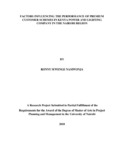| dc.description.abstract | This study sought to assess factors which influence the performance of premium customer schemes in Kenya Power in the Nairobi region. The objectives were to determine the influence of customer requirements, wayleave requirements, funding and availability of construction materials on the performance of premium customer schemes in Kenya Power in the Nairobi area. The study adopted a cross sectional exploratory research design since different groups of respondents were involved and no prior studies have been done on factors that influence the performance of power projects (schemes) that affect premium customers. Many studies done in the past have focused mainly on power projects that affect domestic customers. This study seeks to fill the gap left by lack of emphasis on premium customers despite their vital contribution to social and economic growth of the state. The target population of the study was 90 respondents which was inclusive of both the internal and external stakeholders. The key internal parties were 45 Kenya Power project staff. On the other hand, the key external parties consisted of 25 customers and 20 parties who were required to provide wayleave trace. A census approach was used to obtain information from the entire population. The study used a questionnaire which had both open-ended and closed-ended questions for data collection. The responses from the closed-ended questions were expressed quantitatively and analysed using Statistical Package for Social Scientists (SPSS) version 20 software. Here, the relationship between the independent and dependent variables was analysed using linear regression at a level of significance of 95%. Also, descriptive statistics of mean, sum and proportion were applied to summarize the obtained data. On the other hand, content analysis was used to analyse the qualitative data from the open-ended questions in a bid to understand relationships between the independent and dependent variables. The research revealed that customer requirements have a great influence on the performance of premium customer schemes in Kenya Power. Also, wayleave requirements, funding and availability of construction materials have a very great influence on the schemes. Various issues were determined to have a significant contribution to stalling of premium customer schemes. These included: lack of commitment by some customers in provision of required facilities, limited awareness on the Kenya Power standards that should be met when developing facilities, limited capacity for development of the required power facilities, difficulty obtaining consent from land owners or institutions, delays in getting approvals or consent from land owners or institutions, late payments for the cost of power, some of the customers being unable to afford the cost of power connection, limited involvement of Kenya Power in stakeholder forums, limited financial incentives and project scope changes. Also, lengthy procurement procedures, ineffective forecasting of materials required for construction works, and some construction materials being available in the local market while others requiring sourcing from foreign markets contributed to stalling of the schemes. This study recommends adoption of various key strategies in a bid to improve delivery of premium customer schemes. First, Kenya Power should streamline its internal processes especially material forecasting, procurement procedures and interdepartmental communication. Also, the organization must involve stakeholders in all phases of implementation of premium customer schemes in bid to identify and address any issues or challenges arising during the process. In addition, the government can provide incentives which stimulate connectivity of premium customers. For instance, low tariffs can be applied to power equipment sourced from foreign markets, premium customers can benefit from subsidies and local producers of power equipment can be given tax relief. The public procurement act may be reviewed to minimise procurement restrictions imposed on specialized power equipment being sourced from external markets, competition in the energy sector can be promoted and more efforts can be channelled towards further privatization of the energy sector. | en_US |



